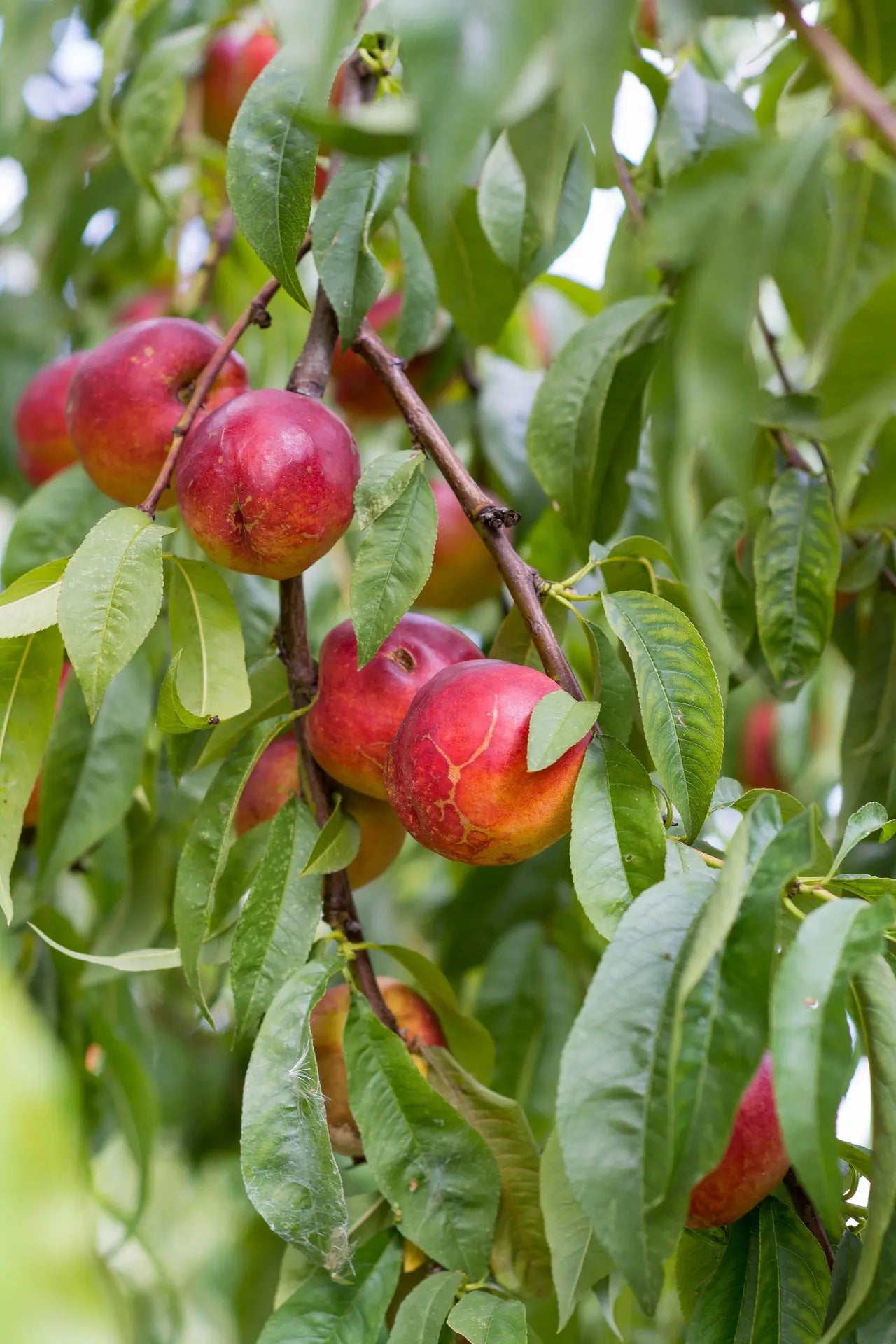-
Delivery from 10 plants to France, Switzerland and Europe
Delivery method -
Fruit Tree Wholesale Supplier
About Us -
Quality Fruit Tree Plants
Technical itinerary
Burma-cov White Flesh Nectarine Tree grafted on RP-40 1L pot
Burma-cov White Flesh Nectarine Tree grafted on RP-40 1L pot
The prices shown are our base prices for large volumes. Depending on the quantity ordered and the producers’ pricing scales, the rate may be adjusted upward. Each quote is personalized to ensure you receive a fair price.
Mini order 50 units / Multiple orders 10 units (FRSHER202503001)
Couldn't load pickup availability
 Buy now and get it delivered when you're ready to plant - Add your desired date to your quote request
Buy now and get it delivered when you're ready to plant - Add your desired date to your quote request
- Delivery from 10 plants to France, Switzerland and Europe

Technical sheet of the Burma-cov white-fleshed nectarine variety
- Fruit flesh color: White
- Skin color: Bright red
- Size and shape: AA (large caliber), Round
- Tree size: Significant vigor, semi-open habit
- Fruit maturity: About 15 days before the Tifany-cov variety
- Fruit taste: Excellent organoleptic qualities (AA). Juicy and fragrant white flesh, good taste quality.
- Earliness of the variety: Semi-early to mid-season (depending on the maturity date of Tifany-cov, around July 25)
- Fruiting period: Early July (about 15 days before Tifany-cov)
- Disease resistance and storage: Very good firmness.
- Variety yield: Very good
- Is this variety self-fertile? Yes
- Commercial use: Good taste quality, good presentation, good firmness, large size, very good production.
- Is this a COV variety? Yes
- Comments: The multiplication and marketing of this variety are regulated and require the authorization of the breeder.
Quick read / the essentials on Nectarinier Burma-cov
The Burma-cov nectarine tree is a white-fleshed variety developed by Agro Sélections Fruits , designed to meet the high demands of the fresh market. With early maturity (mid-July), AA size , excellent firmness and juicy, sweet white flesh , this variety ticks all the boxes for high-end marketing in direct or long-distance channels.
Visually, the uniform, glossy, bright red skin provides an attractive visual appearance on the market stalls. Its resistance to cracking and good transport performance make Burma-cov a wise choice for securing early harvests.
For any arborist wishing to purchase Burma-cov nectarine plants , Arboriverse , a specialist wholesale supplier of nectarine plants , offers this licensed plant material, with tailor-made technical support. Thanks to its self-fertility and floridity, Burma-cov allows for simplified planting and a rapid return on investment.
By choosing Arboriverse, you benefit from a reliable and responsive wholesale supplier specializing in nectarine plants . This is the strategic time to purchase Burma-cov nectarine plants to expand your early-season offerings with a variety with very high potential.
Technical presentation of the white-fleshed nectarine variety Burma-cov for professional producers
The Burma-cov variety is a white-fleshed nectarine developed in France by Agro Sélections Fruits (ASF) , a company renowned for its innovative varieties. Designed to meet the requirements of the professional sector, Burma-cov stands out for its precocity , large size , remarkable taste quality and attractive visual presentation , ideal for the fresh consumption market.
Fruit characteristics
The Burma-cov fruit has a juicy, sweet and fragrant white flesh . The organoleptic qualities are rated AA , which demonstrates a very high level of sensory satisfaction. The texture is pleasant, well balanced between firmness and melting, with a marked aroma.
The size is large , classified AA , corresponding to large fruits sought after in marketing in short and long circuits. The shape is round , regular, facilitating calibration and packaging.
The skin is bright red , uniform throughout the fruit, giving it a shiny and very attractive appearance on the shelf. This intense coloring is particularly appreciated in direct sales markets and in large-scale distribution.
The available information does not specify the post-harvest shelf life , but the firmness of the fruit , considered excellent, allows for good transport resistance and relative resistance to crushing. Resistance to cracking has also been reported, which is an advantage in the event of rain close to harvest.
Agronomic behavior
Burma-cov is an early flowering variety, occurring about five days before Tifany-cov , which is estimated to flower around March 5. This places Burma-cov around late February to early March , which means special vigilance is needed for spring frosts .
The variety is early productive , with maturity set approximately 15 days before Tifany-cov , or around mid-July under standard climatic conditions. This allows it to position itself strategically in the niche of early white nectarines, before the full season of late varieties.
The tree has a semi-open habit , which facilitates the management of light and ventilation in the crown. This habit is also favorable for harvesting and maintenance, particularly for mechanized or high-density plantations.
The tree has significant vigor , which implies good root establishment and a capacity for rapid development. The adult size is not precisely documented , but it is estimated between 3 and 5 meters , in accordance with the standards for nectarine trees.
Fertility and pollination
Burma-cov is self-fertile , which allows for single-variety planting in orchards. However, as with most self-fertile varieties, the presence of other compatible varieties can improve cross-pollination and contribute to an optimized yield .
Resistances and sensitivity
No specific resistance has been documented for Burma-cov against fungal diseases or pests . In the absence of contrary information, it is recommended to consider a classic sensitivity to the main nectarine diseases , in particular leaf curl, powdery mildew and brown rot. Regular phytosanitary monitoring should therefore be maintained, combined with preventive treatments according to local conditions.
Resistance to drought, limestone and root asphyxiation is not specified in the available data. The choice of rootstock adapted to the nature of the soil will play a decisive role here in ensuring the good adaptation of the variety.
Compatible rootstocks
The rootstocks recommended for Burma-cov are those generally used for nectarine trees in France. Their selection should be made according to the soil and climate conditions of the plot:
- GF 677 : for dry and calcareous soils, very vigorous.
- Montclar : for heavy and humid soils, good balance between vigor and productivity.
- Cadaman : for areas at risk of root asphyxiation , with good anchoring and vigor.
- Garnem : resistant to nematodes , effective in replanting situations .
Economic performance
Production is described as very good , although no precise figures in kilograms per tree are provided. On average, a mature nectarine tree in optimal conditions can produce between 20 and 50 kg of fruit . The yield potential per hectare could thus be around 35 to 40 tonnes , depending on the planting density and management method.
The commercial use of Burma-cov is clearly oriented towards fresh consumption , thanks to the aesthetics of its fruits, their post-harvest stability and their high taste quality. This orientation makes it a strategic variety for direct sales, local markets, specialized wholesalers and certain short-distance exports.
Legal status and recommendations
Burma-cov is a variety protected by a Plant Variety Certificate (PVC) . Any multiplication or commercialization is therefore subject to authorization from the breeder, Agro Sélections Fruits (ASF) . It is essential to comply with the license conditions in force before any commercial exploitation.
Conclusion
The Burma-cov nectarine tree stands out as a French variety with strong commercial potential , combining large size, AA quality white flesh , precocity, firmness , resistance to cracking and an attractive bright red presentation . Its self-fertility and good vegetative behavior make it a wise choice for producers wishing to position themselves on the fresh market at the beginning of the season .
To summarize: Nectarine Burma-cov
The Burma-cov nectarine tree is a first-class solution for professionals wishing to exploit an early ripening niche with a white-fleshed fruit of very high taste quality . With an AA size , bright red skin , and remarkable firmness , this variety stands out as much for its aesthetics as for its agronomic performance.
With a harvest starting around mid-July , early flowering and rapid fruit set , Burma-cov fits perfectly into a rationalized production program. The tree, with a semi-open habit and significant vigor , adapts well to modern systems, while allowing good sunshine and efficient harvesting.
To get the most out of this variety, it is essential to use a specialist nectarine plant wholesale supplier . Arboriverse provides certified and compliant equipment, allowing producers to purchase Burma-cov nectarine plants in optimal conditions.
Designed for fresh consumption , Burma-cov is a profitable variety, suitable for both short and long supply chains. Buying Burma-cov nectarine plants means investing in a high-performance French variety, supported by a specialist wholesale supplier of nectarine plants committed to working alongside arborists.
-
Burma-cov White Flesh Nectarine Tree grafted on Garnem bare-root 100-120 cm
Regular price €5,95 EURRegular priceUnit price / per -
Burma-cov White Flesh Nectarine Tree grafted on RP-40 bare-root 100-120 cm
Regular price €6,55 EURRegular priceUnit price / per -
Burma-cov White Flesh Nectarine Tree grafted on PR-R/Mirared bare-root 100-120 cm
Regular price €6,15 EURRegular priceUnit price / per -
Burma-cov White Flesh Nectarine Tree grafted on GF677 and Mirab.29-C bare-root 100-120 cm
Regular price €5,75 EURRegular priceUnit price / per -
Burma-cov White Flesh Nectarine Tree grafted on Garnem 1L pot
Regular price €6,25 EURRegular priceUnit price / per -
Burma-cov White Flesh Nectarine Tree grafted on RP-40 1L pot
Regular price €6,85 EURRegular priceUnit price / per



